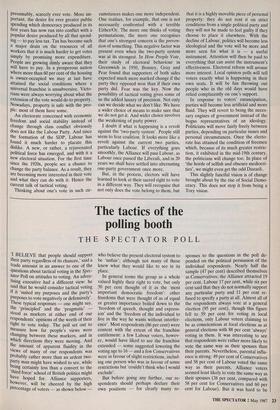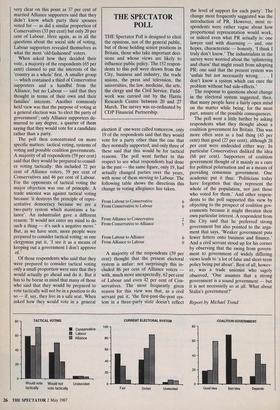The tactics of the polling booth
THE SPECTATOR POLL
`I BELIEVE that people should support their party regardless of its chances,' said a trade unionist in an answer to one of the questions about tactical voting in the Spec- tator Poll on attitudes to voting. An adver- tising executive had a different view: he said that he would consider tactical voting if it 'suited my purposes and the party's Purposes to vote negatively or defensively'. These typical responses — one might say, the 'principled' and the 'pragmatic' stood as markers at either end of our respondents' opinions of the worth of their right to vote today. The poll set out to measure how far people's views were changing between these markers, and in which directions they were moving. And the amount of apparent fluidity in the views of many of our respondents was probably rather more than an ardent two- Party man might have wished to see, while being certainly less than a convert to the third force' school of British politics might have hoped for. Alliance supporters, however, will be cheered by the high percentage of voters — as shown below — who believe the present electoral system to be 'unfair% although not many of these knew what they would like to see in its place.
In general terms the group as a whole valued highly their right to vote, but only 50 per cent thought of it as the `most important democratic freedom': other freedoms that were thought of as of equal or greater importance boiled down to the `freedom of speech, thought and express- ion' and the 'freedom of the individual to live in the way he wants without interfer- ence'. Most respondents (86 per cent) were content with the extent of the franchise entitlement: a few Labour voters, howev- er, would have liked to see the franchise extended — some suggested lowering the voting age to 16 — and a few Conservatives were in favour of slight restrictions, includ- ing one person who was in favour of some restrictions but 'couldn't think who I would exclude'.
But before going any further, our re- spondents should perhaps declare their own positions — for clearly many re- sponses to the questions in the poll de- pended on the political persuasion of the individual respondents. Nearly half the sample (47 per cent) described themselves as Conservatives; the Alliance attracted 19 per cent, Labour 17 per cent, while six per cent said that they do not normally support any particular party and 11 per cent re- fused to specify a party at all. Almost all of the respondents always vote at a general election (95 per cent), though this figure fell to 59 per cent for voting in local elections, only Labour voters claiming to be as conscientious at local elections as at general elections with 88 per cent 'always' voting in them. It was interesting to see that respondents were rather more likely to vote the same way as their spouses than their parents. Nevertheless, parental influ- ence is strong: 49 per cent of Conservatives and 58 per cent of Labour voted the same way as their parents. Alliance voters seemed least likely to vote the same way as their spouses (38 per cent, compared with 58 per cent for Conservatives and 60 per cent for Labour). But it was hard to be very clear on this point as 37 per cent of married Alliance supporters said that they didn't know which party their spouses voted for — as did a similar proportion of Conservatives (33 per cent) but only 20 per cent of Labour. Here again, as in all the questions about the social side of voting, Labour supporters revealed themselves as what the most 'old-fashioned' voters.
When asked how they decided their vote, a majority of the respondents (65 per cent) claimed to put the interests of the `country as a whole' first. A smaller group — which contained a third of Conservative supporters and a handful from the Alliance, but no Labour — said that they thought in terms of their own and their families' interests. Another commonly held view was that the purpose of voting at a general election was 'to elect the party of government'; only Alliance supporters de- murred to any degree, a quarter of them saying that they would vote for a candidate rather than a party.
The poll then concentrated on more specific matters: tactical voting, systems of voting and possible coalition governments. A majority of all respondents (59 per cent) said that they would be prepared to consid- er voting tactically: this included 72 per cent of Alliance voters, 59 per cent of Conservatives and 46 per cent of Labour. For the opponents of tactical voting the major objection was one of principle. A trade unionist was against tactical voting because 'it destroys the principle of repre- sentative democracy because we are a two-party system which maintains a ba- lance'. An industrialist gave a different reason: 'It would not enter my mind to do such a thing — it's such a negative move.' But, as we have seen, more people were prepared to consider tactical voting: as one clergyman put it, 'I see it as a means of keeping out a government I don't approve of.'
Of those respondents who said that they were prepared to consider tactical voting only a small proportion were sure that they would actually go ahead and do it. But it has to be borne in mind that many of those who said that they would be prepared to vote tactically will not be in a position to do so — if, say, they live in a safe seat. When asked how they would vote in a general election if one were called tomorrow, only 19 of the respondents said that they would vote for a party other than the one that they normally supported; and only three of these said that this would be for tactical reasons. The poll went further in this respect to see what respondents had done in the past — the same figure, only 19, had actually changed parties over the years, with none of them moving to Labour. The following table shows the directions this change in voting allegiance has taken.
From Labour to Conservative 6 From Conservative to Labour 0 From Alliance to Conservative 2 From Conservative to Alliance 5 From Labour to Alliance 6
From Alliance to Labour 0 A majority of the respondents (59 per cent) thought that the present electoral system is unfair: not surprisingly this in- cluded 86 per cent of Alliance voters with, much more unexpectedly, 62 per cent of Labour and even 42 per cent of Con- servatives. The most frequently given reason for this view was that, as a civil servant put it, 'the first-past-the-post sys- tem in a three-party state doesn't reflect the level of support for each party'. The change most frequently suggested was the introduction of PR. However, most re- spondents were rather vague about how proportional representation would work, or indeed even what PR actually is: one lawyer said with disarming — and, one hopes, characteristic — honesty, 'I think I truly don't know.' The industrialists in the survey were worried about the 'splintering and chaos' that might result from adopting PR: one said that the present system was `unfair but not necessarily wrong. . . . I don't know a system which can cure the problem without bad side-effects.'
The response to questions about change in the electoral system suggested, then, that many people have a fairly open mind on the matter while being, for the most part, unsure of the possible consequences.
The poll went a little further by asking respondents what they thought about a coalition government for Britain. This was more often seen as a bad thing (45 per cent) than good (27 per cent), although 28 per cent were undecided either way. In particular Conservatives disliked the idea (68 per cent). Supporters of coalition government thought of it mainly as a cure for political polarisation and as a means of providing consensus government. One academic put it thus: 'Politicians today have forgotten that they represent the whole of the population, not just those who voted for them.' And other respon- dents to the poll supported this view by objecting to the prospect of coalition gov- ernments because it might threaten their own particular interest. A respondent from the City said that he preferred strong government but also pointed to the argu- ment that says, 'Weaker government puts fewer fetters onto business and finance.' And a civil servant stood up for his corner by observing that the swing from govern- ment to government of widely differing views leads to 'a lot of false and short-term policy being put about'. Best of all, howev- er, was a trade unionist who sagely observed, 'One assumes that a strong government is a sound government — but it is not necessarily so at all. What about Stalin's government?'
Report by Michael Trend



















































 Previous page
Previous page